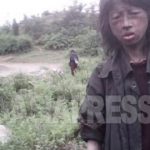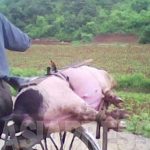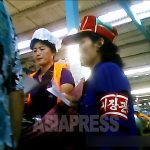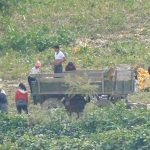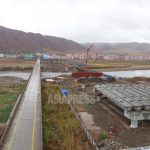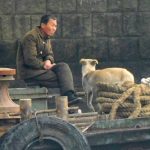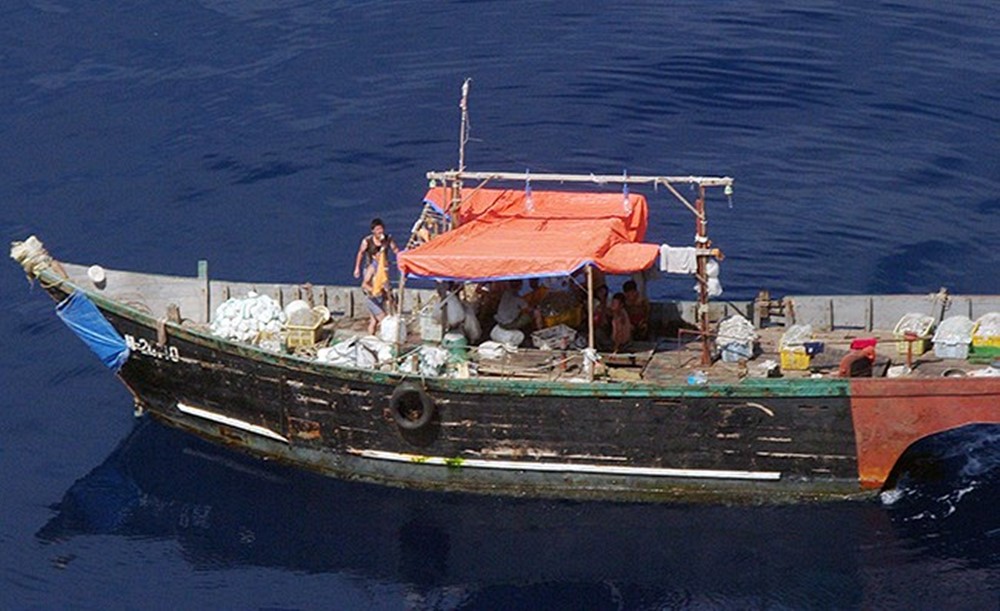
To conclude this series, ASIAPRESS examines in two installments how the fishing and agricultural industries, which can be considered major sectors of the North Korean economy, have changed as a result of the pandemic. In this article, ASIAPRESS examines the current state of North Korea's fishing industry through the experiences of Kim Chung-yeol (defected in May 2023) and Kang Gyu-rin (defected in October 2023), who operated private fishing boats in North Korea's West and East Sea areas. (JEON Sung-jun)
◆ Structure of North Korea's Fishing Industry
Along with agriculture, fishing is one of the few sectors of the North Korean economy where production is actively maintained. To understand North Korea's post-pandemic fishing industry, it's necessary to briefly examine its structure.
In the 1980s, a nationwide campaign called the "Loyalty Foreign Currency Earning Movement" was launched to collect and contribute government funds. Each institution set out to secure sources of foreign exchange to carry out the tasks assigned by the Party. North Korea's cheap seafood, which was in high demand in Japan and China, was an important source of foreign exchange. As a result, fishing bases were established along the east and west coasts under the control of the party, the military, the government, and major institutions.
This background contributed to the fact that the fishing industry was marketized faster than any other sector after the "Arduous March" in the mid-1990s. In a situation where the national economy was on the verge of collapse, it became difficult to continue fishing methods that relied mainly on trawlers. It became difficult to repair and maintain fishing vessels, and fuel supplies weren't any easier.
During this time, a new fishing method emerged: individuals began using small wooden boats to catch fish and sell them in markets. This led to the rise of private boat owners. Throughout the 2000s, these boat owners became a significant presence along North Korea's coastline. They reinvested their profits from fishing to expand their operations, upgrading to larger boats and replacing manual labor with engines. As they grew, they began to employ more people and became important economic pillars in their coastal communities.
After that, the authorities continued their efforts to keep the ship owners' growing influence under state control, especially after Kim Jong-un came to power. Many ship owners avoided crackdowns by registering their private fishing boats with fishing bases under power institutions such as the military or the security department, and paying profits from fishing activities.
The pandemic period was hard on ship owners. As the Kim Jong-un regime imposed restrictions on going out to sea for quarantine reasons, wooden boats were left ashore for years, withering and becoming unusable. Many shipowners lost their boats during this period and were no longer shipowners. Even if they had boats, they eventually became small-scale fishermen who lost out in the competition for the patronage of certain power institutions that guaranteed fishing rights. Kim Chung-yeol and Kang Gyu-rin were among the few shipowners who survived. Let's look at the current state of North Korea's fishing industry through their secrets of becoming ship owners and surviving as such during the pandemic.

◆How to Become a Ship Owner, According to Kim Chung-yeol
Kim Chung-yeol (33), from the west coast, was a fleet commander with 150 employees at a fishing base near Haeju, South Hwanghae Province, before defecting. He was also the de facto owner of three boats registered as state property. We asked about the process of building and operating fishing boats.
Q: We heard you operated boats affiliated with a state-run fishing base.
Kim Chung-yeol: The fishing boats I operated were registered as state property, but I was the actual owner. I built the boats with my own funds. There were 10 boats in the fleet, and all the other boats were also privately owned, just registered under the state's name. When we caught fish, I handled the products myself and paid profits to the enterprise. In return, I could work in the fishing grounds under the enterprise's name. Just before I defected, I usually earned about 200-300 dollars a day (about 50 dollars in net profit).
Q: How can one acquire a fishing boat?
Kim Chung-yeol: In my case, I built a new boat. First, you need to buy timber in Haeju. A 75-horsepower boat typically requires about 70 cubic meters of timber. It costs about 55 dollars per cubic meter. So, about 4,000 dollars goes to timber. Then you take it to a 'power workshop', a specialized boat-building factory, and leave it there for a month or two. You have to pay 800 dollars for labor there. During that time, another 500 dollars goes to workers' meals and other expenses. Just the boat itself costs about 5,000 dollars.
Q: What other costs are involved?
Kim Chung-yeol: A lot of money goes into getting various permits. First, you have to pay 150 dollars for the use of the site to build the boat. Then, you need to get a new construction permit from the maritime supervisory office, which requires a bribe of about 500 dollars. In addition, it costs 150 dollars each to get various certificates such as radio permits and GPS registration certificates.
※The maritime supervisory office is an agency that supervises the activities of ships to comply with international maritime regulations and prevent maritime accidents.
※The military mobilization department is a department dedicated to military service under the Organization Mobilization Supplement Bureau (formerly the Ranks Supplement Bureau) of the Ministry of Defense, established in each province, city, and county to carry out new recruit recruitment in the respective areas.
You also need to register the ship as a mobilization target with the military mobilization department. The pretext is to transport military supplies in case of emergency. The military registration certificate costs about 100,000 won (North Korean currency). If you don't do this, you can't put your boats to sea later.
The most difficult thing was getting the 'mobile work certificate.’ This requires permission from the military to move fishing work areas, and it cost 800-900 dollars per boat. Money isn't everything.
Q: So how much does a 75-horsepower fishing boat cost in total?
Kim Chung-yeol: From my experience, including all fishing gear and materials, it cost about 17-18 thousand dollars. The boat alone was about 13,000 dollars. It's not easy to build even one boat unless you have a fair amount of money.
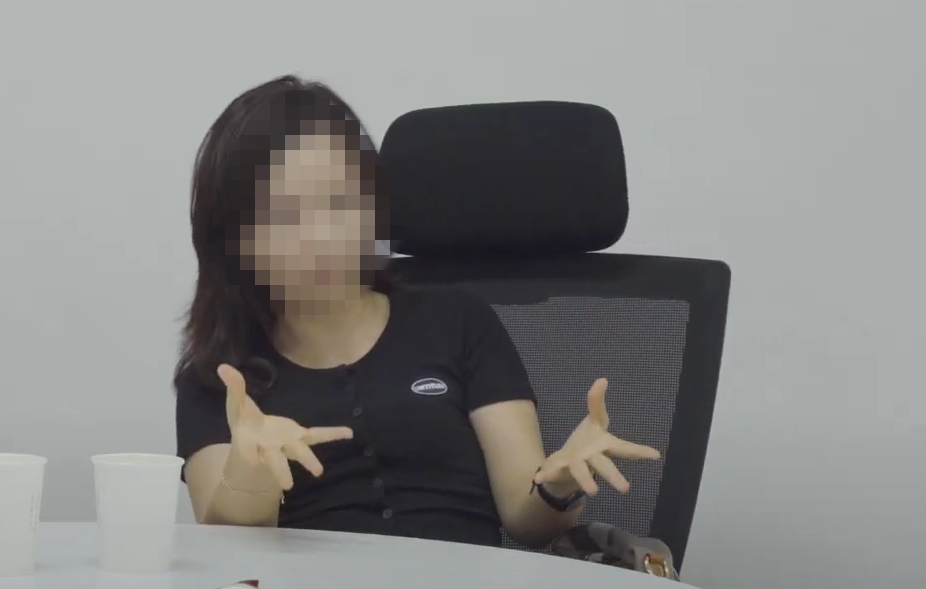
◆ Fighting with the Central Committee to Achieve Profits - Kang Gyu-rin's Story
Kang Gyu-rin (23) defected with her family on a boat from a port in South Hamgyong Province last October. Before defecting, she operated a 22-horsepower fishing boat and employed divers to catch shellfish. We asked about the inner workings of North Korea's coastal fishing industry, especially seafood distribution.
Q: How did you start fishing?
Kang Gyu-rin: At first, I had no intention of owning a boat, and it wasn't a field I knew well, but my then-boyfriend, who had experience as a ship owner, kept saying we should try it together because the earnings were good. So I borrowed money from my mother and started. But in less than a month, I felt offended by being constantly told what to do when I was the ship owner. Finally, I told him I would do it myself from now on and to keep his hands off. At first, I lost a lot of money because I didn't know anything. But as I kept going without giving up, I gradually learned about how to do things and started making money.
Q: How did you catch fish?
We registered and worked under a base affiliated with the Central Committee, and we mainly caught shellfish. Shellfish were exported. My boat had 22 horsepower, and divers would go in and dive for shellfish. We also prepared to catch squid at one point, but we gave up because no squid were caught.
Q: How were the products distributed?
Kang Gyu-rin: In our area, we initially gave 40% to the fishing base. But nearly 20 ship owners united and fought with the state. We said, "We're working our bones off to contribute this much, but you don't compensate us when there's a diving accident, and fuel costs are so high..." So we struggled and lowered it to 30% at first, and eventually to 20%.
Q: When you say the state, do you mean you fought with the officials at the fishing base?
Kang Gyu-rin: No, people from the Central Committee were there. At that time, even the base chief was on our side. Because if we don't work, the base chief can't meet the plan, and if they can't meet the plan, they get fired. But even the people coming down from the Central Committee can't ignore our demands because we're the ones making money for them.
Q: From a ship owner's perspective, what's the income versus expenditure like?
Kang Gyu-rin: Usually, if one boat brings in 1 million won worth of catch per day, after deducting 20% tax, fuel costs, and meal expenses, about 600,000-700,000 won is the ship owner's share. But from this, you still have to deduct boat maintenance costs and diver wages. However, since the initial investment is about 6,000 to 7,000 dollars, it takes time to recoup that.
Q: How much are the diver wages?
Kang Gyu-rin: If the shellfish sold for 1 million won, we split it in half after deducting the plan contribution and fuel costs. For example, if we deduct 200,000 won for tax and 200,000 won for fuel, out of the remaining 600,000, I keep half, 300,000 won, and the divers who worked together split the other 300,000. If three people worked, they each got 100,000 won.
Q: How do you find divers?
Kang Gyu-rin: We buy them with money. The ship owner can make money only if the diver has good skills. At first, I didn't know this and used any diver, which caused a lot of losses. Even if they claim their skills are high without actual ability, you can tell right away from the results. Then I would firmly tell that person that this won't work and they should look for another boat.
So to find good divers, we sometimes pay off their debts and bring them in. I've paid up to 7 million won to bring someone in. Later, I even went to the west coast to recruit, paying all travel expenses. If they have the skills, we even used 'non-labor'.
Q: What is 'non-labor'?
Kang Gyu-rin: Non-labor literally means using people without permission. If I wanted to bring in a good diver from the west coast, I had to make fake documents for them. But because they produce well, we had to bring them in somehow. I even used people from the west coast who were wanted by the security department. It doesn't matter as long as they made money.
Q: You started operating a boat at 21, weren't there any difficulties?
Kang Gyu-rin: Most of the people operating boats around me were men, mostly 27-year-old bachelor ship owners, and even they found it really difficult. Being a ship owner isn't as easy as it sounds. So when I first said I was going to start fishing, everyone around me told me to do something else. People even mocked me, saying a young woman couldn't be a ship owner alone, but I said there's nothing impossible in this world and that I would show them I could do it. Everyone laughed then.
But after that, the results spoke for themselves. There's competition among ship owners too. From about 6 months in, I always ranked 1st or 2nd. Our base chief said he completely surrendered (to my success).
Q: Were there any other difficulties while fishing?
Kang Gyu-rin: The crackdowns were the hardest. It's not hard to go out to sea and catch fish. Because if you catch them, you make money. But the crackdowns are too severe, both on land and at sea. There are various inspection teams, and if even one boat document is wrong, they search everything. Then they confiscate all the products. You lose everything, including fuel costs. For one wrong document, they take away the engine, or even confiscate the boat. Then you have to go and pay 200-300 dollars to get it back.
But what was even harder than that was when exports were restricted. Usually, shellfish are exported to China, and whenever that was no longer allowed, the prices plummeted, so that's what made us most anxious. If we were caught by an inspection team, we could resolve it by paying money, but with exports, there's nothing I could do.
The testimonies of these two individuals, from just a year ago, illustrate the reality of capitalist production relationships pervasive throughout North Korea’s socialist fishing industry even after the pandemic. At the same time, we can glimpse the dynamism of the fishing scene, the entrepreneurial spirit of the donju (wealthy entrepreneurs), and even the seeds of a coldly rational labor market and labor unions.
ASIAPRESS will examine the reality of North Korea's rural economy in the next installment. (To 10>>)
- <Lighting Up N. Korea's Four Dark Years> (10) The Capitalist Ghost Under the Socialist Roof (2) "Leave the Quota to Me" - Are Wealthy Individuals the Driving Force of Rural Economy?
- <Lighting Up N. Korea's Four Dark Years> (8) Pandemic-Induced Financial Crisis and the Regime's Response: 'Tax-Free' North Korea Imposes New Levies, Including 'Fireplace Tax'
- <Lighting Up N. Korea's Four Dark Years> (7) North Korea’s Pandemic Power Play: State Seizes Market Control as “Donju” Crumble
- <Lighting Up N. Korea's Four Dark Years> (6) Humanitarian Crisis is a Man-Made Disaster: Intensifying Chaos and Disorder... North Korean Version of 'War on Crime' as Told by COVID Survivors
- <Lighting Up N. Korea's Four Dark Years> (5) What Happened During COVID... "Drink Willow Branch Brew" - Misguided Quarantine Policies Only Led to Residents' Deaths
- <Lighting Up N. Korea's Dark Four Years> (4) “The People Are at the End of Their Tether”: A Country that Wants to Control Markets and Rule by Calories
- <Lighting Up N. Korea's Dark Four Years> (3) The Second Link in the Tragedy – Ruthless Quarantine Policy, "The State is Scarier than the Virus"
- <Lighting Up N. Korea's Four Dark Years> (2) The First Link in a Tragic Chain - Border Closure... "Corona Was a Nightmare, It Was Difficult to Buy Even a Single Needle"
- <Lighting Up N. Korea's Four Dark Years> (1) Almost the Only Escape Route -The New Generation ‘Donju’ Who Crossed the Sea Tell About COVID-19, Chaos, and Social Change
